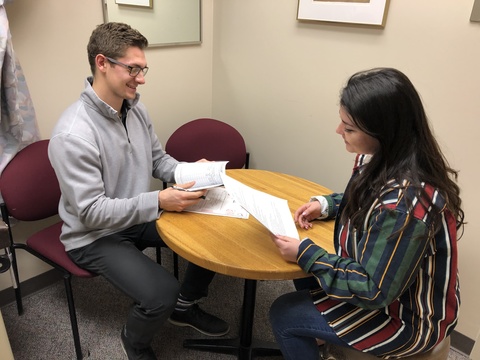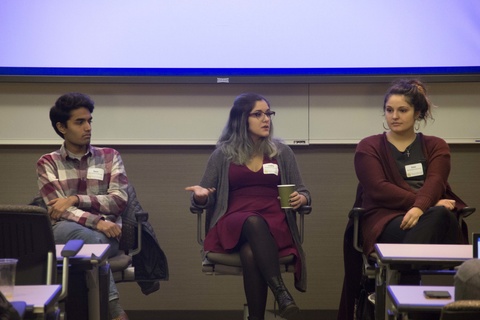Finding a research position is the first step in your research adventure. Research benefits go beyond discipline-specific techniques. This page has resources to help you make the most of your research involvement and develop widely-applicable skills like communication, mentoring, gaining funding and awards, writing personal statements, and asking for letters of recommendation.
Always make sure you get transcript recognition for your research involvement. CLICK HERE to learn more.
Your Best Start and Further Development
- How will you document your research results? Are there specific protocols for keeping records in your research group?
- To whom do you expect to go if you have questions about your research project? Does your mentor expect you to come solely (or first) to them, or should you feel free to ask others in the research group? If others, can your mentor identify those in the group who would be good resource people for your project?
- Are you comfortable with the methodology used in the lab? Does it involve the use of animals, for example? Does it involve lengthy field trips where you might be isolated with other researchers for weeks at a time? How do you feel about that?
- Will the research that you will be involved in be confidential? Are you allowed to discuss your project with other individuals outside of your laboratory?
- What role will your mentor play in the development of your skills as a writer? Is your mentor willing to help you with your research-related writing along the way or does he/she only want to read it after it is in its final version? If your mentor onlywants to read final versions of your writing, could he appoint someone in the laboratory/research team to proof read your writings?
- Do you know all the institutional safety and ethics training that is required to work in your research project? Discuss the required training with your mentor and establish a deadline by which you should complete it.
- If you have previous research experience, what skills do you expect to bring to your new research group?
Adapted by E. Frazier, C. Pfund, and A. R. Butz from Branchaw, Pfund & Rediske (2010). Entering Research: A Facilitator's Manual. New York: WH Freeman & Company, and from Pfund, Wassarman & Skarlupka (2014). Establishing your Mentoring Relationships for CMB, Biophysics and Nutritional Sciences. Branchaw, J. L., Butz, A. R., & Smith A. (2018). Entering Research (2nd ed.). New York: Macmillan.
Mentee Training 1: University Titles and Structure (PDF)
Mentee Training 2: Who is in a Research Setting (PDF)
Mentee Training 3: Mentees (PDF)
Mentee Training 4: Mentoring Relationships (PDF)
Mentee Training 5: Mentors (PDF)
Mentee Training 6: Letters of Recommendation (PDF)
Mentee Training 7: Personal Statements (PDF)
Communicating research is vital, whether the audience is a patient, a legislator, or another professional in your field. OUR offers online resources to help you develop research communication skills for presentations or family dinners.
Poster Presentations
Oral Presentations (In development)
Talking to Friends and Family (In development)

OUR Events & Awards
OUR offers events to help students practice communication and presentation skills and learn more about the opportunities that research leads to. OUR also runs a number of awards to recognize and support undergraduate researchers. Follow our website, social media channels, or newsletter to keep updated
OUR Events and Awards
Fall and Spring Undergraduate Research Festivals (FURF/SURF)
Poster sessions designed to give presenters experience in speaking to both general and academic audiences.
Research in the Capitol
Poster session with all 3 Regent Universities; Presenters speak to state legislators about their research.
Marshall Undergraduate Research Conference
Half-day conference to help students get involved in research.
Three Minute Research Story Competition
Presenters give a comprehensive overview of their work in less than three minutes.
Resources and Workshops
Online and in-person, available throughout the year covering topics like presenting, poster preparation, and graduate school materials.
OUR Research Fellowships
Competitive summer and academic year funding for mentored research with UI faculty and staff.
OUR Travel Awards
One-time award of up to $500 for conferences, presentations, and other research-related travel.
Partnered Funding
Grants and Fellowships through on-campus partnerships.
Excellence in Undergraduate Research Awards
Recognition for students who have gone above and beyond in their research. Fellowship and travel stipend included.
Distinguished Mentor Awards
Recognition for those mentors who make a positive difference in the research lives of their
Please check back in this space as we do update it when opportunities arise.
Serve as a research ambassador to help other undergraduate and prospective students learn about research at the university. For more information, visit our Ambassador Information Page.
Funding
Securing funding is great practice for writing grants and using communication skills. Follow OUR's Newsletter "OUR Updates" for other scholarship and funding opportunities that we hear about.
Funding Sources
OUR Fellowship Program - Small Fellowship stipends awarded to students doing mentored research and creative scholarship projects in all disciplines.
Research Supply Grants - Up to $1000 to fund undergraduate research projects that have a funding deficit.
OUR Fellowship Program - Small Fellowship stipends awarded to research and creative scholarship projects in all disciplines between students and mentors.
Dewey Stuit Fund for Undergraduate Research For students in the College of Liberal Arts and Sciences.
John and Elsie Mae Ferentz Undergraduate Research Fund For students in the College of Liberal Arts and Sciences.
Student Impact Grants allow UI students in any discipline to pursue opportunities outside of the classroom.
Hawkeye Experience Grant For unpaid summer internships and research experiences
Discover, Engage, Inspire For underrepresented/underserved students who want to work in Psychological and Brain Sciences, Communication Sciences and Disorders, and similar labs.

Conferences
Conferences, especially discipline-specific, are great ways for students to deepen their research involvement. Conferences offer presentation and networking opportunities that students cannot get elsewhere. Students considering graduate school and workforce options after graduation should talk to their mentors and strongly consider attending discipline-specific conferences.
Presentations
Presentations help students practice and solidify critical research communication skills. From medical doctors explaining complicated diseases to a young patient to political lobbyist hoping to convince legislators to vote for important bills, communicating in-depth information to broad audiences is vital in any career.
How-To Resources
Poster Presentations
Oral Presentations (In development)